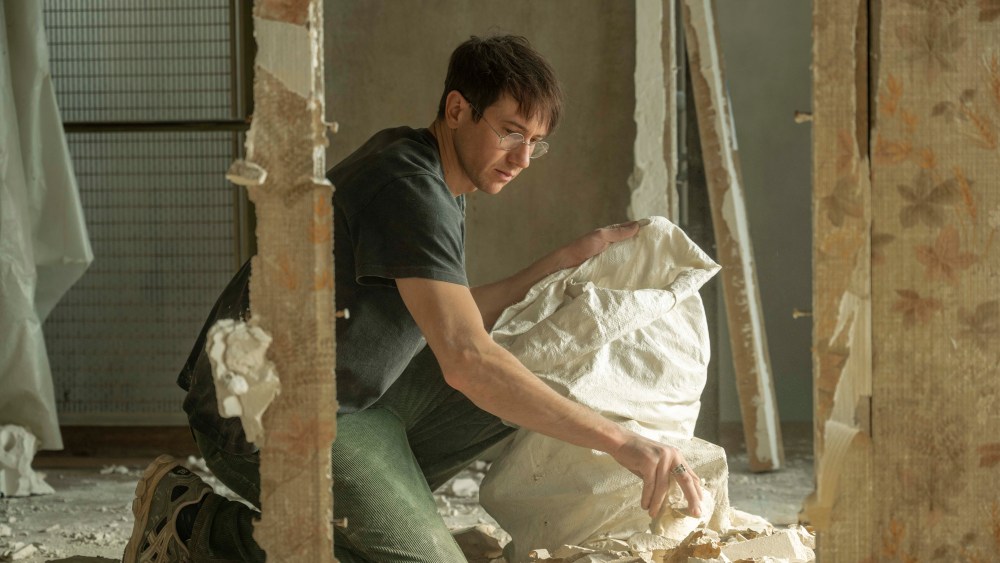Nobody but the perilously naive these days expects to become a writer and get rich. Perhaps more are surprised by how hard it is to become a writer and actually get writing. A vocation increasingly treated by the world as a hobby, it can get ever more wearyingly squeezed between day jobs and domestic obligations and less stimulating freelance gigs, until it’s hard to find the words, even when you find the time. “Why don’t you get a real job?” asks a relative of published but little-read Parisian author Paul (Bastien Bouillon), presumably not for the first time, in Valérie Donzelli’s subtly piercing character study “At Work.” What she doesn’t know, or doesn’t care to know, is that Paul in fact has many other very real jobs — albeit of the low-paid menial variety that likewise don’t meet with the approval of middle-class capitalists.
Donzelli’s seventh feature as writer-director, “At Work” takes a welcome introspective turn after the glossy genre melodramatics of her sixth, 2023’s “Just the Two of Us.” It bristles with testy economic politics, though they largely itch beneath the surface of an unassuming, intimately observed character portrait. That’s apt enough, since the character in question is himself an invisibly restless still-waters figure, too often criticized by casual employers for his taciturn reserve. Paul saves his candor for the page, which in turn is criticized by his publishers. His work, they concede, is lucid and articulate and sometimes confessionally close to the bone, but can they sell that? Paul fears art imitating life by also boiling down to breadline survival strategies.
Who we write for, and why, is one of many untidily answered questions knotted into this simply framed but mountingly poignant film, a low-key highlight of this year’s Venice competition. Brief but episodic and deliberately paced, it’s arguably not a film that Donzelli made with a wide audience in mind, though it will be closely embraced by those viewers who identify with its particular personal and creative neuroses, and who recognize the stealthily seismic dramatic stakes of a single well-placed compliment from exactly the right reader. It’s a film first and foremost for writers, in other words, and why not? There’s plenty against them.
Not that Paul, 42 years old and newly divorced, is overly inclined toward self-pity. He chose the meager life of the writer, after all, after years of making a good living as a photographer — not the kind of soulless grind that tends to push people toward the blank page, but an art for which he simply lost the feeling. He’s talented enough to have three books in print, though not canny enough for any of them to have been a success: His frustrated publisher Alice (Virginie Ledoyen) instructs him to write with more “energy and hope,” while his disapproving father (André Marcon) more brusquely asks why he doesn’t just write a bestseller.
After his jaded ex (Donzelli) moves to Canada with their two near-adult children in tow, Paul is forced to give up the comfortable family apartment for a crummy studio loaned by a family friend. Poverty comes gradually, then at all once. Resistant to seeking full-time employment that would exhaust his writing time, Paul instead signs up to a website that assigns one-off menial jobs — yard work, rubble removal, flatpack furniture assembly — to the freelancer willing to work for the lowest possible rate. Not long ago, such an idea would have seemed dystopian; now, that’s just the everyday gig economy whittled down to its most cruelly efficient form.
If Paul’s family and few friends are troubled by this development, however, he merely takes it in his increasingly aching, hobbled stride. Work is work, and there’s writerly reward, too, in daily encounters with a diverse range of taskmasters across all social groups. A habitual people-watcher, he starts taking notes from each job, which might cumulatively build to a larger work. Adapted from a novel by Franck Courtès, Donzelli and Gilles Marchand’s sharp script likewise gains structure, momentum and pathos from these mini-encounters — some droll, some enraging, some glancingly tragic.
Each, however, is packed with flinty, perceptive details regarding who we become around those we employ, and those who employ us. Irina Lubtchansky’s wintry, low-lit camerawork is also spatially attuned to unspoken power dynamics in ordinary spaces, where even a casually locked balcony door, for example, becomes a fraught barrier between have and have-not.
Bouillon has been steadily working in French TV and cinema for over 15 years now — his first feature film credit, in fact, was in Donzelli’s 2011 tearjerker “Declaration of War” — but he’s something of a late-blooming star, recently cultivating a distinctively bruised masculine presence in films as disparate as “The Night of the 12th” and “The Count of Monte Cristo.” He’s entirely wonderful here, giving Paul a shuffling physicality and a still, soulful air of discontent that protectively wrap around a slightly unreadable core: He hasn’t yet found what he’s really about. Whatever that is, Donzelli’s generous, empathetic but respectfully muted film gives him time and space to write his way toward it.

